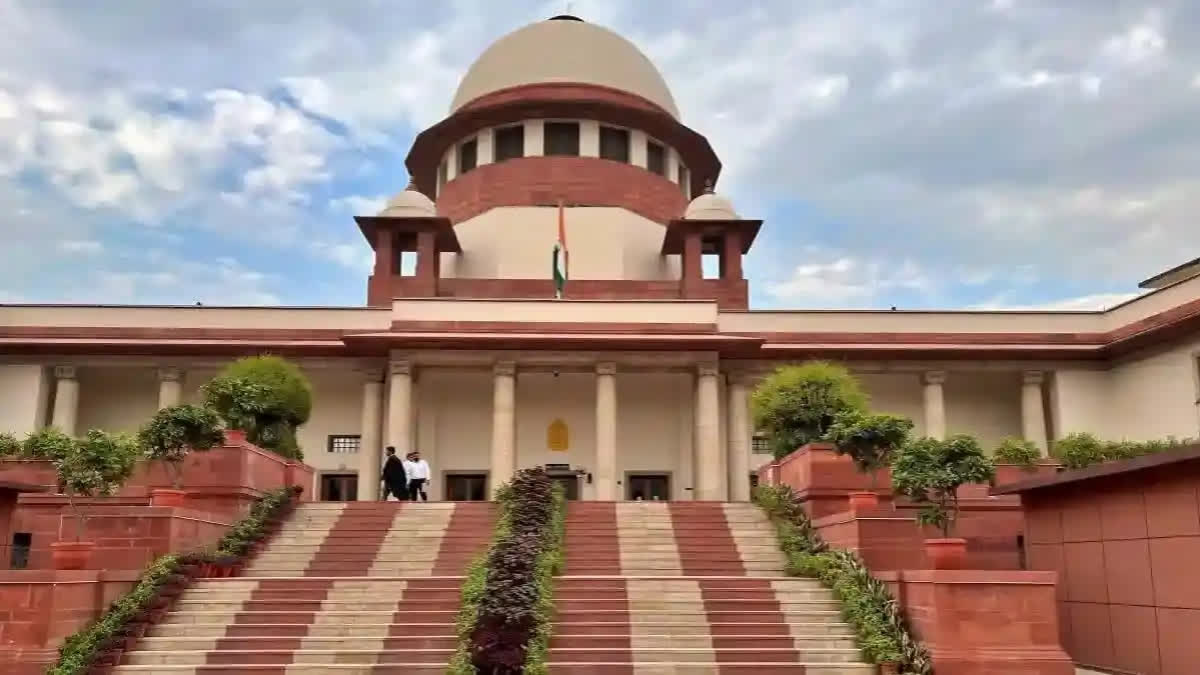New Delhi: The Supreme Court on Tuesday said that there is no blanket proposition that a candidate is required to lay his life out threadbare for examination by the electorate. The apex court also emphasized that it is not necessary for a candidate to declare every item of movable property that he or his dependent family members owns, such as, clothing, shoes, crockery, stationery etc, unless the same is of such value as to constitute a sizable asset in itself.
A bench comprising justices Aniruddha Bose and Sanjay Kumar said: “Though it has been strenuously contended before us that the voter’s ‘right to know’ is absolute and a candidate contesting the election must be forthright about all his particulars, we are not inclined to accept the blanket proposition that a candidate is required to lay his life out threadbare for examination by the electorate”.
The apex court made these observations while upholding the election of Independent MLA Karikho Kri from Tezu assembly constituency in Arunachal Pradesh in 2019.
Justice Kumar, who authored the judgment on behalf of the bench, said the candidate's ‘right to privacy’ would still survive as regards matters which are of no concern to the voter or are irrelevant to his candidature for public office. “In that respect, non-disclosure of each and every asset owned by a candidate would not amount to a defect, much less, a defect of a substantial character”, said justice Kumar.
The bench said: “It is not necessary that a candidate declare every item of movable property that he or his dependent family members owns, such as, clothing, shoes, crockery, stationery and furniture, etc., unless the same is of such value as to constitute a sizeable asset in itself or reflect upon his candidature, in terms of his lifestyle, and require to be disclosed”.
The bench made it clear that every case would have to turn on its own peculiarities and there can be no hard and fast or straitjacketed rule as to when the non-disclosure of a particular movable asset by a candidate would amount to a defect of a substantial character.
The bench said, for example, a candidate and his family who own several high-priced watches, which would aggregate to a huge figure in terms of monetary value, would obviously have to disclose the same as they constitute an asset of high value and also reflect upon his lavish lifestyle.
“Suppression of the same would constitute ‘undue influence’ upon the voter as that relevant information about the candidate is being kept away from the voter. However, if a candidate and his family members each own a simple watch, which is not highly priced, suppression of the value of such watches may not amount to a defect at all. Each case would, therefore, have to be judged on its own facts”, said justice Kumar.
The apex court set aside the July 17, 2023 judgment of the Itanagar bench of the Gauhati High Court., which declared the election of Kri from Tezu in Lohit district as "null and void". The high court had opined that the nomination of Kri was improperly accepted by the returning officer (RO) as he had failed to disclose the three vehicles in question, which continued to be registered in the name of his dependent family members.
Non-submission of the ‘No Dues Certificate’ in respect of the government accommodation occupied by him during his earlier tenure as an MLA was also held to weigh against him.
Lastly, the high court held that non-disclosure of the taxes due and payable by Karikho Kri and his wife was a defect of substantial character and the same tainted his nomination. The high court concluded that the acceptance of Kri’s nomination by the RO was improper and as he was the returned candidate, the question of pleading and proving that such improper acceptance of his nomination materially affected the result of the election did not arise.
The high court had delivered the judgment on an election petition filed by the then Congress candidate, Nuney Tayang, challenging the declaration of the 2019 assembly election result.
Citing an apex court judgment, the bench said this court had observed that voters have a right to the disclosure of information which is ‘essential’ for choosing the candidate for whom a vote should be cast.
Justice Kumar said that the case law on the subject also manifests that this court has always drawn a distinction between non-disclosure of substantial issues as opposed to insubstantial issues, which may not impact one’s candidature or the result of an election.
The bench said, in Resurgence India vs. Election Commission of India and another (2014), this court had observed that if the Election Commission accepts nomination papers in spite of blank particulars therein, it would directly violate the fundamental right of the citizen to know the criminal antecedents, assets, liabilities and educational qualifications of the candidate.
“We are of the firm view that every defect in the nomination cannot straightaway be termed to be of such character as to render its acceptance improper and each case would have to turn on its own individual facts, insofar as that aspect is concerned”, said the bench.
The high court said that Kri had not submitted his nomination paper in accordance with Section 33 of the Representation of the People Act, 1951. Tayang had filed the petition, under the Act, seeking a declaration that the election to the member of legislative assembly from the Tezu assembly constituency be declared void. It was alleged that Kri made false declarations in his election nomination paper by not disclosing that he was in occupation of a government accommodation, namely MLA Cottage No 1 located in 'E' Sector, Itanagar.
The apex court said the failure on the part of Karikho Kri to disclose the dues of municipal/property taxes payable by him and his wife, the same cannot be held to be a non-disclosure at all.
“We hold that the High Court was in error in concluding that sufficient grounds were made out under Sections 100(1)(b), 100(1)(d)(i) and 100(1)(d)(iv) of the Act of 1951 to invalidate the election of Karikho Kri and, further, in holding that non-disclosure of the three vehicles, that still remained registered in the names of his wife and son as on the date of filing of his nomination, amounted to a ‘corrupt practice’ under Section 123(2) of the Act of 1951”, said the apex court, in a 42-page judgment.


